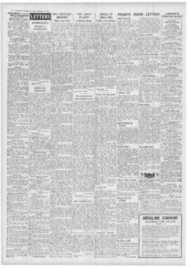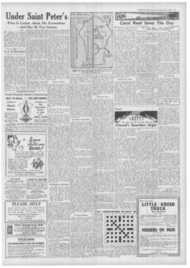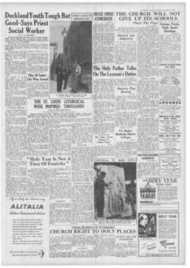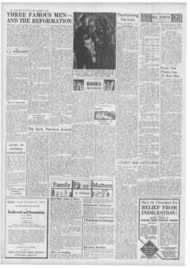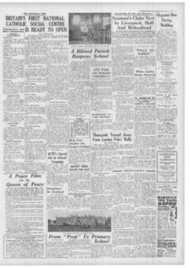Page 6, 9th September 1949
Page 6
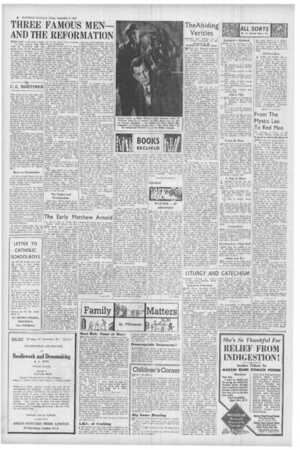
Report an error
Noticed an error on this page?If you've noticed an error in this article please click here to report it.
Tags
Share
Related articles
Tractarians For Our Times
28 Years Ago He Urged The Easter Vigil, And—
The Revolution Through
Charterhouse N Chronicle
Eve Of The Eucharistic Con Gress India Honours Legate
THREE FAMOUS MEN AND THE REFORMATION
by
C. G. MOR TIMER THIS bock* is not only a study • of three famous men who were all concerned with the earlier stages of the Reformation movement in England; it is also an endeavour to show their rela• tionships with one another and to give as a background some idea of the trend of events on the Continent. All three died within 15 months of each other: More was beheaded on Tower Hill on July 6, 1535: Erasmus died at Basle in July, 1536, in the odour of sanctity, as has recently been established: Paul III would have willingly made him a Cardinal. Tyndale, a victim of Henry VIII. was burnt at Vilvorde in October,
1536, crying at the stake with a fervent zeal and loud voice: Lord, open the King of England's eyes.
Erasmus was the moderator of the Movement—he wished to proceed slowly and peacefully, to create a world where scholar and statesman could work hand in hand. It is often said that he laid the eggs for the Reformation, hatched by Luther. It is true that in his earlier days he used his biting and satirical style to castigate the vice and ignorance of the period. But Erasmus was by no means the author of the Dutch Reformation. He was a cosmopolitan scholar and his position has been compared to that of Voltaire in the 18th ccntury.
Erasmus and More were devoted friends and in Holbein's picture we see the true Erasmus, shy, retiring, sensitive, but with his hands resting on a book called in the Greek, " the labours of Hercules." For not only did Erasmus try to clean up some corner of the Augean stable but the works he produced, his Biblical and patristic editions, for instance. might indeed be called "Herculean." His increasing greatness, the " hard, gemlike flame" of his absorption in sacred study, was recognised during his own lifetime and, if not himself a Saint, Erasmus had a Saint for his friend and supporter—Sir Thomas More.
More on Communism
Of More himself there is no excuse for ignorance in our own day, for his Utopia is accessible to every reader. In this work we find More's views on Communism:
"It seems to me that one cannot live conveniently where all things are held in common. How can there he plenty when everyone will excuse himself from labour? For since the hope of gain does not excite a man. he will trust to other men to do for him what he is under no necessity to do for himself: and he will become lazy (and therefore unproductive). And if people come to be pinched with want and yet cannot dispose of anything of their own. what can follow upon this but perpetual sedition and bloodshed. . And More makes a great point of this, the capital importance of maintaining reverence and authority.
Is there no lesson here for our own times? -And More is not, of course, speaking of the voluntary Communism of the early Christians: but of that forced, State Communism that he deplores.
However in this book the author wisely draws our attention to the part More played as a Catholic controversialist against Tyndale. This " Dialogue " is an enormous work— it runs to 170.000 words and was occasioned by the arrival in this country of Tyndale's English version of the New Testament. There is no question that this version is tendentious—they called it " heretical " in the 16th century. Constantly we find that priest is changed to senior. church to congregation, charity to love, grace to favour, penance to repentance, confession to knowledge, and contrite to troubled.
I am afraid the modern reader is apt to shy at controversy but if he would understand what the Reformation was about and how Tyndale. the disciple of Luther, is trying to help the cause, he must grasp the main issue. Dismiss for the moment all the charm of Humanism. the thrill of new discovery and even the plea that the Church was in dire need of reform, which was all too true. What was the heart of the matter? It was without question Luther's doctrine of Justification by Faith alone. In technical language. Luther made Grace extrinsic to human nature.
Put more simply. Luther forgot the Parable of the Good Samaritan who found the man half-dead (not wholly dead, as Luther thought) by the wayside and poured in oil and wine." Christ teaches us here in a simple figure what was to be the Sacramental system of His Church. Grace is like a medicine introduced into the body—not. as Luther held. a cloak in which the sinner is wrapped.
Luther no doubt arrived at his doctrine as an anodyne for his own interior perplexities. But in the event, this teaching of Justification by Faith alone contained in potence all Protestantism: the Unfree Will. Predestination, the attack on Hierarchy and Sacramentalism. the Priesthood of all Believers, the Invisible Church.
And Tyndale's vocabulary in his Version of the New Testament was subtly to suggest and reinforce such tenets.
The same clarity of mind, the same unflinching zeal for Catholic principles. brought More to Tower Hill. He refused to attend the Coronation ceremony of Anne Boleyn in Westminster Abbey. For that Anne never forgave him. And it is doubtful if Henry VIII ever forgave Anne herself for forcing his hand to make away with a man whom in his heart he still revered.
The Tudors and Protestantism
There was a further result. as our author points out. of this doctrine of uncurbcd individualism. taught by Luther and Tyndale. It is as all very well for the Humanists to exalt the greatness of the individual man, personal sincerity. the dictates of reason against " authority." But this principle was imbibed by Tudor and Stuart alike—an uncurhed monarchical individualism in the sphere of
religion and politics. Here is the key not only to the reign of Henry but to the " divine right " of the following century. And what endless trouble it brought on England!
And since then. even down to our own day, has it not encouraged an uncurbed individualism in industry that only now at last begins to suffer its proper abatement," (p. 152).
Happy then is the country that can move between these two extremes. too much or too little individualism.
Much of Tyndale's life is still obscure; he gradually abandoned his priesthood and after a last rebuff, as it seemed to him. from the Bishop of London, he found his spiritual home in Wittenberg and matriculated at its University (under an assumed name) in May. 1542. nierswas a time when even Henry VIII would have availed himself of Tyndale's undoubted gifts of controversy — and Tyndale was of course one of the great founders of modern Eng lish. When '1 yndale refused to oblige Henry. that monarch pursued him to his death.
So of the three men discussed in this work. two died for their respective beliefs and the third alone managed to evade his foes.
Not even More could foresee the twists and turns of the English Reformation in the 16th century. though by his death a decisive stage had been reached. Nor could Erasmus foretell how that movement known as Counter-reform, in and by the Church. would issue in the revived Papacy. the work of the Jesuits or the Council of Trent. Nor did Tyndale know that the whole Reformation movement would he cast in more decisive form by the genius of Calvin and how his strange doctrine of Predestination would not create inertia or apathy but a system that alone could pit itself in many countries against the old Faith. It was a Christian world, fostered and taught by the Church. that revolted at last against its Mother and produced the religious chaos of our day. But over these wild waters the example of our martyrs still calls to us. and the voice of More. bidding us yet be merry!
I trust many will read this book whose enormous issues I have tried here to review. It is a wise hook and its quiet. unpretentious counsel will hearten many a Christian,
* Erasmus. Tyndale. and More, by W. E Campbell. (Eyre & Spoolswoode. 15s, net.) The Sacred Heart Recorder. a bright record of parochial activities in Singapore, is marred. inside and outside. by two inadequate pictures of the " Sacred Heart " which make one wish for an " (*stet" on such representations.
blog comments powered by Disqus



